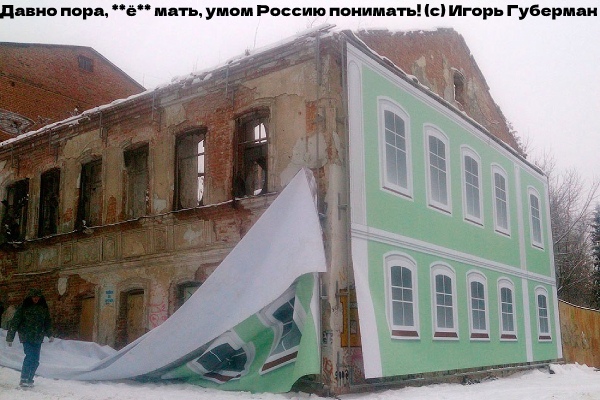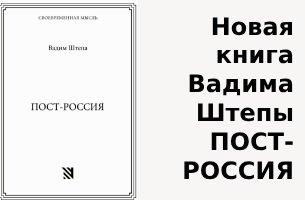English text below
Любые попытки реформирования России бесперспективны по одной простой причине: они упираются в российский иррационализм, то «темное иррациональное начало», о котором писал больше ста лет назад Н.А.Бердяев.
Чем оно характеризуется?
Во-первых, отсутствием легитимности государства. Если СССР с 1922 г. имел хотя бы формальный источник легитимности в виде Договора от 30.12.2022 г., то у «постсоветской» России его не существует. Это государство никто и никогда не учреждал, оно просто появилось «по факту», как самый крупный осколок СССР.
Во-вторых, это иррационально большая страна, веками управляемая из одного центра в Москве или Санкт-Петербурге.
В-третьих, это иррациональная политическая система, которая вопреки ее рациональным аналогам, представляющим собой треугольник, прочно опирающийся на одну из сторон, балансирует на одной из вершин в виде Спасской башни Кремля.
В-четвертых, это иррациональная экономика, которая уже сто шесть лет функционирует исключительно в форме грабежа, генерирует экстремальные издержки и не восприимчива ни к инновациям, ни к рациональным стимулам развития.
В-пятых, это иррациональная внешняя политика и милитаризация, не отвечающие ни реальным угрозам, ни возможностям, ни интересам страны.
В-шестых, это государственная идеология, направленная на расчеловечивание людей и деградацию человеческого капитала.
В-седьмых. это отсутствие реальных долговременных бенефициаров, без чего невозможно никакое рациональное развитие государства.
И это можно продолжать.
Соответственно, исходя из этого, правомерно поставить вопрос о преодолении этого процесса путем рационализации и легитимизации здравого смысла. Это своего рода перепрограммирование всего государства и общества в категориях разумного, целосообразного и обоснованного.
Прежде всего, на мой взгляд – это легитимизация государства. Источником легитимности может стать только его учреждение. Разумеется это не открытие. Почти сорок лет назад М.С.Горбачев и его единомышленники ощутили необходимость переучреждения СССР в виде подписания нового союзного договора. Именно это и стало началом рационализации СССР.
Но несмотря на то, что в команде Горбачева впервые за весь период существования СССР после Ленина были и юристы, и просто более-менее образованные люди, они не поняли, что этот новый Союз должен быть не только навязан сверху, а воспринят снизу.
Но поскольку далеко не везде он был поддержан снизу, то единственным аргументом того, самого прогрессивного советского верха оказались саперные лопатки в Тбилиси, танки в Вильнюсе и ОМОН в Риге. Когда власть поняла, что рационализация страны – это не диктат, а договор, она попыталась рационализировать СССР с 15 хотя бы до 9 республик.
Иррациональный путч ГКЧП попытался это сорвать, но рационализация в виде появления множества новых политических субъектов все же состоялась. На первых порах они стремились к договорным отношениям, поэтому распад прежнего СССР произошел относительно бескровно. Хотя этот процесс остановился в России и привел к сегодняшней ситуации.
Предстоящая рационализация России имеет три возможных варианта.
Первый – это учреждение страны свободными субъектами, каждый из которых получает это право на своем референдуме. Источник власти – это не Кремль и не Госсовет, а человек, община, территория, регион. И только они вправе наделить властью и Кремль, и Парламент и даже самых хороших русских оппозиционеров.
Регионы России будут не испрашивать всяческие разрешения и деньги, но сами определят объем передаваемых полномочий в центр вместе с финансовыми ресурсами для их реализации. Так строится всякая нормальная федерация.
Примерно такая логика заложена в решениях Съезда народных депутатов, который проходит в Польше, при явном неудовольствии тех, кто готов сразу же созвать в Москве Госсовет или строить вновь централизованную «прекрасную Россию будущего». Вторые более озабочены не политической субъектностью граждан и регионов, но лишь сохранением империи в существующих границах.
Второй вариант – это распад России. Если мы становимся на рациональные позиции, мы признаем в полном объеме правосубъектность каждого субъекта нынешней РФ.
В том числе, право на их самоопределение. И не только национальных республик, но и «обычных» областей с большинством русского населения, которые точно также колонизированы Москвой и ресурсами которых Кремль оплачивает свои авантюры или просто обогащается.
Рационализация потому так и называется, что она опирается не просто на этничность, а на равноправие и на здравый смысл.
На сегодняшний день во многих регионах сформированы инициативные группы по самоопределению. И это пока находится на разных этапах. Есть республики, такие как Чечня, Татарстан, Башкортостан, Калмыкия, Якутия-Саха, которые опираются на принятые еще в 1990 году Декларации о государственном суверенитете. Некоторые сформировали правительства в изгнании, которые опираются на национальные диаспоры, а есть и регионы, в которых эти процессы пока находятся в зачаточном состоянии. Есть региональные интеграционные инициативы, такие как в Сибири, на Урале, на Дальнем Востоке и т.д.
В таких проектах просматриваются контуры будущего устройства этой территории. Первично именно наличие рациональной проектности, а не этничность и не простой механический распад на 85 регионов.
Третий вариант, на мой взгляд, наиболее вероятен – это сочетание первого и второго. Это независимость тех регионов, где народы и элиты смогут это реализовать и учреждение Российской республики из регионов, которые пожелают ее учредить.
Хотя в общем-то все три варианта – это различные пути рационализации нынешней России.
Позиция путинского режима по этому вопросу вполне предсказуема и очевидна. С целью противодействия рационализации Кремль распространяет три основных нарратива.
- Это неизбежное наступление хаоса в случае распада России (т.е. утраты власти Путиным и его подельниками).
- Это опасность распространения ядерного оружия и попадания его в руки террористов, как будто Кремль сегодня таковым не является.
- Это неизбежное поглощение Китаем построссийских государств.
Но почему все эти три нарратива Кремля словно по команде повторяют «хорошие русские» вроде команд Навального, Ходорковского, многих участников «Форума свободной России» и т.д.? Видимо, рационализация России одновременно противоречит имперским интересам и Путина, и столь же иррациональной российской оппозиции.
Если говорить о первом нарративе, то Кремль шантажирует Запад перспективой хаоса, а оппозиция ,в свою очередь, концентрируется на перспективах появления коррумпированных режимов. Что можно сказать по этому поводу?
При распаде СССР на первом этапе бенефициарами распада были три народа и двенадцать республиканских элит. За 30 лет бенефициарами независимости стали народы Украины и Молдовы. Постепенно происходят изменения в Казахстане, Армении, Грузии, Киргизии, Беларуси. И это несмотря на неоимперскую роль России на постсоветском пространстве.
В любом построссийском государстве социальные дистанции между властью и народом будут значительно меньше, а возможностей привлекать Росгвардию из других регионов России не будет вовсе.
Что касается нарратива о ядерном оружии, то я уже много раз писал и объяснял, что ЯО находится не в регионах России, а в Кремле, на Знаменке (МО РФ) и в деревне Власиха Одинцовского района Московской области, где расположен штаб РВСН. Без «кнопок», расположенных там, применение ЯО технически невозможно.
Говоря об угрозе поглощения российских регионов Китаем, следует отметить, что этот риск существенно выше при иррациональной России настоящего чем при независимых построссийских государствах, являющихся субъектами международного права и способных самостоятельно выбирать себе международных партнеров. А сегодняшний Дальний Восток фактически превращен в совместную сырьевую колонию Москвы и Пекина.
Рационализация России – это не единовременное действие или решение. Это сложный процесс, который безусловно имеет свои риски. Но при этом следует не забывать высказывание Марка Аврелия: «Кто не рискует, тот рискует значительно больше».
Vitaly Ginzburg
Rationalism As an Instrument of Post-Russian Change
Any attempts to reform Russia are rendered futile for one simple reason: They collide with Russian irrationalism — the «dark irrational origin,» about which Russian philosopher Nikolai Berdyaev wrote more than a hundred years ago.
How does this irrationality manifest itself?
First, Russia lacks state legitimacy. The USSR had at least a formal source of state legitimacy through the 1922 treaty on the establishment of the Soviet Union, whereas «post-Soviet» Russia has no such legal basis. The current Russian state was never established by anyone; it merely emerged «de facto» as the largest fragment of the former Soviet Union.
Second, Russia is an irrationally large country, ruled for centuries from a single centre in Moscow or St. Petersburg.
Third, Russia has an irrational political system that — contrary to its rational counterparts that are triangles firmly resting on one side — balances precariously on one of its corners: Presidential authority in the Kremlin.
Fourth, Russia has an irrational economy that has functioned solely as a mechanism of plunder for 106 years. It generates exorbitant costs and remains impervious to innovation or rational incentives for development.
Fifth, Russia has an irrational foreign policy and obsession for militarisation that fail to address the real threats, opportunities, or interests of the country at large.
Sixth, Russia propagates a state ideology that is aimed at dehumanising people and degrading human capital.
Seventh, the Russian state has no real long-term beneficiaries, without which no state can hope to develop rationally.
The list goes on and on.
Consequently, there is ample reason to assert that this situation can only be resolved through a process of rationalisation and the use of common sense. This would require a comprehensive «reprogramming» of the entire state and society, rooted in reason, prudence, and justified action.
First of all, this process entails legitimising the state. Any state legitimacy can only stem from its establishment. This is not a new concept. Almost 40 years ago, then Soviet leader Mikhail Gorbachev and his associates recognised the need to re-establish the USSR through a new union treaty. This marked the beginning of the rationalisation of the Soviet Union.
However, despite the fact that Gorbachev’s team — for the first time in the entire period of the USSR’s existence after Lenin — included both lawyers and fairly well educated people, they failed to understand that the new union state should not just be imposed from above but also accepted from below.
Since the union treaty lacked universal support from below, the only recourse of the most progressive Soviet leadership ever was the use of sapper shovels in Tbilisi, tanks in Vilnius, and OMON special forces in Riga. When the authorities realised that rationalisation could not be achieved by diktat but only through mutual agreement, they made an attempt to consolidate the USSR into at least nine republics from the initial fifteen.
The irrational putsch of August 1991 tried to thwart this process. However, despite the challenges, rationalisation nevertheless did take place through the creation of many new political entities. At first, they sought to enter into contractual relations, thus ensuring that the collapse of the former Soviet Union was relatively bloodless. Regrettably, this process stalled in Russia, eventually leading to the current state of affairs.
Russia’s future rationalisation presents three possible options.
The first option involves the establishment of the state by free countries, each obtaining this right through independent referendums. The source of power should not reside in the Kremlin or the State Council, but with the people, the community, the territory, and the regions. They alone have the right to delegate powers to the Kremlin, to the parliament, or to the «good Russians» of the current anti-Putin opposition.
Russian regions would no longer petition for permits and budget funds from Moscow; instead, they would determine the extent of powers to be transferred to the federal centre, along with the necessary financial resources. This is how any normal federation is built.
This model echoes the logic underlying the decisions of the Congress of People’s Deputies, which convened in Poland. The decisions were much to the displeasure of those who seek to assemble the State Council in Moscow or build a newly centralised «Beautiful Russia of the Future.» The latter seem more concerned with preserving the empire within its existing borders than with empowering Russian citizens and regions politically.
The second option involves the disintegration of the Russian Federation. Adopting a rational standpoint means recognising the legal status of each constituent member of the current Russian Federation, including their right to self-determination. This applies not only to the national republics but also to regions with a majority Russian population. Moscow has colonised both and is using their resources to fund military adventures and enrich those in power.
Movements calling for self-determination have surfaced in many Russian regions. Each of those movements are at different stages of development. There are republics like Bashkortostan, Chechnya, Kalmykia, Sakha, and Tatarstan, which rely on declarations of state sovereignty dating back to 1990. Some have formed governments in exile, drawing on national diasporas, and there are regions where these processes are still in their infancy. Moreover, there are initiatives for regional integration in Siberia, the Urals, the Far East, and beyond.
Such projects offer glimpses into the potential future state structure of the territory of today’s Russian Federation. The primary concern is devising a rational plan, rather than categorising regions based solely on ethnicity or resorting to mechanical divisions into 85 separate regions.
The third option, in my opinion, stands as the most likely one: A combination of the first and the second options. This means granting independence to regions where people and local elites demonstrate the ability to attain it, while concurrently establishing a Russian republic through voluntary union among regions that wish to join together.
All three options represent different ways to carry out the rationalisation of present-day Russia. This process would not be based on ethnicity alone but rather on equality and common sense.
The position of the Putin regime on this issue is quite predictable and obvious. In order to counter the idea of rationalisation, the Kremlin is pushing three main narratives.
First, the Kremlin claims that chaos is the inevitable consequence should Russia disintegrate, — in other words, if Putin and his associates were to lose power.
Second, the Kremlin persisently highlights the risk of nuclear weapons proliferation, warning of the danger of these weapons falling into the hands of «terrorists,» as if the Kremlin were not such today.
Third, the Kremlin asserts that China would inevitably assume control of any post-Russian states.
However, it is quite perplexing that these Kremlin narratives are being echoed by so-called «good Russians,» including opposition leaders Alexei Navalny and Mikhail Khodorkovsky, many participants of the Free Russia Forum, and others. It appears that Russia’s rationalisation runs counter to the imperial interests of both the Putin regime and the equally irrational Russian opposition.
Regarding the first narrative, the Kremlin uses it to blackmail the West, emphasising the prospect of chaos, while the opposition focuses on the likelihood of the emergence of corrupt regimes. Let us consider this more closely.
The first beneficiaries of the collapse of the Soviet Union were three independent nations and twelve republican elites. Over the past thirty years, the people in Ukraine and Moldova managed to gain the benefits of national independence. Changes are also gradually taking place in Armenia, Belarus, Georgia, Kazakhstan, and Kyrgyzstan, despite Russia’s neo-imperialist influence in the post-Soviet space.
In any post-Russian state, the social distance between the government and the people would be significantly smaller, and there would be no possibility to call in the National Guard from other regions of Russia to quell popular unrest.
As for the nuclear weapons narrative, I have repeatedly pointed out that the nuclear buttons are not distributed among the Russian regions but are located in the Kremlin, in the Defence Ministry, and at the headquarters of the Strategic Rocket Forces. Without the «red buttons,» the use of nuclear weapons is technically impossible.
Regarding the threat of a Chinese takeover of Russian regions, this risk is much higher in an irrational Russia than in independent post-Russian states. The latter would be subjects of international law, capable of independently choosing their own international partners. Moreover, it is worth noting that Russia’s Far East has essentially become a joint resource colony for Moscow and Beijing.
The rationalisation of the Russian Federation is not a one-time action or decision; it is a complex process that undoubtedly carries risks. Nevertheless, we should not forget the old adage: «He who does not take risks, risks much more».
* Vitaly Ginzburg is former head of an engineering company and author of more than 100 articles on the problems of rationalising Russia. The text was translated by Kerkko Paananen.
_____________________________________________________
Подписывайтесь на Телеграм-канал Регион.Эксперт
Поддержите независимый регионалистский портал
Другие статьи автора:
- От Берлина до Парижа
- Оппозиция прошлому и оппозиция будущему
- Генералы и холопы
- Вверх по лестнице, ведущей в пропасть
- Певчих спела не о том
- Деактивация всея Руси
- Фейконавтика
- Орки тонут в Орске
- Экономика: имперская или межрегиональная?
- Что нам делать с Москвой?
- Деколонизация задает сложные вопросы
- Крупинки смысла из песчаной пурги
- Последний Надеждин Русской Демократии
- От мороза трещат не трубы. Трещит Россия
- Построссия — это экономическое развитие регионов
- Дело и тело историков
- ГАЗАфикация России и построссийские перспективы
- Чему учат в русской школе? Размышления в День учителя
- Прометеизм как свобода
- Единая оппозиция за единую Россию
- Распад России для окружающего мира – меньший риск, чем ее сохранение



























2 Comments
Pingback: Распад России для окружающего мира – меньший риск, чем ее сохранение | Регион.Эксперт
Pingback: Единая оппозиция за единую Россию | Регион.Эксперт